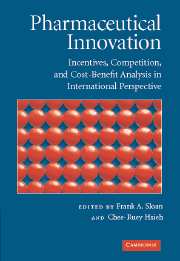 Pharmaceutical Innovation
Pharmaceutical Innovation Published online by Cambridge University Press: 18 December 2009
Introduction
High-income nations use patent incentives to fund most new drug discovery. However, most victims of tropical diseases are unable to pay prices high enough to cover the research and development (R&D) costs of new medicines (Hollis, Chapter 4). Thus, foundations and governments in high-income nations (hereinafter collectively “sponsors”) must fill the gap. Before the 1990s, sponsors spent about $50 million per year on worldwide drug discovery for neglected diseases. This figure was clearly inadequate in a world where per-drug R&D costs averaged $802 million (DiMasi, Hansen, and Grabowski 2003). Predictably, R&D results were practically nonexistent. Indeed, just 12 of the 1,233 “new chemical entities” licensed worldwide between 1975 and 1997 were approved to treat tropical diseases in humans (Kremer and Glennerster 2004). Fortunately, recent developments are more hopeful. Worldwide R&D spending on diseases of poverty could reach $500 million per year by decade's end (Ridley 2004). While this level of funding is still small by commercial standards, it is at least plausible. The challenge now is for sponsors to get the most “bang” from every dollar spent.
Given that ordinary patent incentives do not work, what new incentives should sponsors create to supplement or replace them? Section II introduces the main proposals that have been suggested. The first category, denoted “end-to-end” strategies, consists of proposals in which sponsors mimic the patent system by announcing a single reward for researchers who successfully complete the entire drug discovery pipeline.
To save this book to your Kindle, first ensure [email protected] is added to your Approved Personal Document E-mail List under your Personal Document Settings on the Manage Your Content and Devices page of your Amazon account. Then enter the ‘name’ part of your Kindle email address below. Find out more about saving to your Kindle.
Note you can select to save to either the @free.kindle.com or @kindle.com variations. ‘@free.kindle.com’ emails are free but can only be saved to your device when it is connected to wi-fi. ‘@kindle.com’ emails can be delivered even when you are not connected to wi-fi, but note that service fees apply.
Find out more about the Kindle Personal Document Service.
To save content items to your account, please confirm that you agree to abide by our usage policies. If this is the first time you use this feature, you will be asked to authorise Cambridge Core to connect with your account. Find out more about saving content to Dropbox.
To save content items to your account, please confirm that you agree to abide by our usage policies. If this is the first time you use this feature, you will be asked to authorise Cambridge Core to connect with your account. Find out more about saving content to Google Drive.